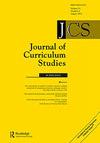教师课程能力:教师在课程制定中的行为
IF 2
3区 教育学
Q1 EDUCATION & EDUCATIONAL RESEARCH
引用次数: 0
摘要
本文提出了教师课程能力的概念,它是教师在课程方面的理论或正式知识和个人实践知识和取向的融合。我们将这种能力置于制度、政治和哲学的语境中。通过对不同阶段的数学课程(即官方课程、计划课程和制定课程)和教师能力框架的研究,我们详细阐述了教师如何根据其知识和取向与课程互动。在处理课程时,教师课程能力是指教师关注的内容和他们如何解释课程,以及他们为什么根据当地学生的需要做出决定,包括何时引入特定的概念或技能。此外,我们认为与课程互动的过程有助于塑造教师的知识和取向。本文对在国家强制实施的集中式课程体系下教师课程能力的概念界定具有重要意义。虽然我们以数学学科为例,但也讨论了该领域未来研究的前景领域的研究含义。本文章由计算机程序翻译,如有差异,请以英文原文为准。
Teacher curriculum competence: how teachers act in curriculum making
This conceptual paper puts forward the construct termed teacher curriculum competence, which is an amalgamation of theoretical or formal and personal practical teacher knowledge and orientations in relation to curriculum. We situate the competence in institutional, political, and philosophical contexts. Drawing on research related to mathematics curriculum at different stages (i.e. the official, intended, and enacted curriculum) and teacher competence frameworks, we elaborate on how a teacher interacts with curriculum informed by their knowledge and orientations. When working with curriculum, teacher curriculum competence refers to what teachers attend to and how they interpret curriculum, as well as why they make decisions, including when to introduce particular concepts or skills, based on their local students’ needs. In addition, we argue that the process of interacting with curriculum helps shape teacher knowledge and orientations. This article is significant for the contribution it makes to conceptualizing teacher curriculum competence in a centralized curriculum system, that is a nationally mandated. Although we use the mathematics discipline as an example, implications for research in promising areas for future studies in this space are also discussed.
求助全文
通过发布文献求助,成功后即可免费获取论文全文。
去求助
来源期刊

Journal of Curriculum Studies
EDUCATION & EDUCATIONAL RESEARCH-
CiteScore
4.70
自引率
4.80%
发文量
19
审稿时长
24 weeks
期刊介绍:
Journal of Curriculum Studies publishes conceptually rich contributions to all areas of curriculum studies, including those derived from empirical, philosophical, sociological, or policy-related investigations. The journal welcomes innovative papers that analyse the ways in which the social and institutional conditions of education and schooling contribute to shaping curriculum, including political, social and cultural studies; education policy; school reform and leadership; teaching; teacher education; curriculum development; and assessment and accountability. Journal of Curriculum Studies does not subscribe to any particular methodology or theory. As the prime international source for curriculum research, the journal publishes papers accessible to all the national, cultural, and discipline-defined communities that form the readership.
 求助内容:
求助内容: 应助结果提醒方式:
应助结果提醒方式:


